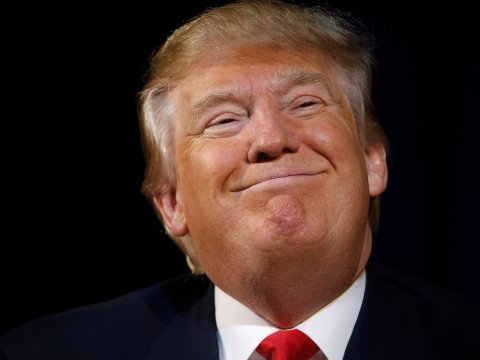Posted on
September 3, 2021
Unserious Condition
Trump's timid Taliban deal
by
Daniel
Clark
All right. So
Donald Trump is not responsible for the actions of Joe Biden. Trump's agreement with the Taliban did not require
Biden to withdraw our forces from Afghanistan, let alone compel him to do so
impetuously, and with shockingly little consideration for his fellow human
beings. Contrary to Biden's
buck-passing, our current president was in no way bound by the deal that had
been made by his predecessor. In a way,
that's what makes Trump's "treaty" so outrageous.
The official name of the Trump-Taliban deal, "Agreement
for Bringing Peace to Afghanistan between the Islamic Emirate of Afghanistan
which is not recognized by the United States as a state and is known as the
Taliban and the United States of America," sounds like the title of a
straight-to-video Borat sequel, which it might well be, since it is no
laughing matter. One may be tempted to
chuckle at the 22-word legalese appellation for the illegitimate body with
which the deal was struck, but the most illegitimate part of the title is "and
the United States of America," because we as a nation agreed to no such thing.
 President
Trump signed this agreement, which includes such clauses as, "The United States
is committed to withdraw from Afghanistan all military forces of the United
States, its allies, and Coalition partners, including all non-diplomatic
civilian personnel, private security contractors, trainers, advisors, and
supporting services personnel withing fourteen (14) months following
announcement of this agreement," when he had no authority to commit our forces
on behalf of another Commander-in-Chief, let alone allies who were not even
involved in the negotiations. Trump
never had any intention of submitting his document to Congress for ratification
as a treaty, which means that the United States of America is not a party to
it, and the language of the agreement, right down to its title, is fraudulent.
President
Trump signed this agreement, which includes such clauses as, "The United States
is committed to withdraw from Afghanistan all military forces of the United
States, its allies, and Coalition partners, including all non-diplomatic
civilian personnel, private security contractors, trainers, advisors, and
supporting services personnel withing fourteen (14) months following
announcement of this agreement," when he had no authority to commit our forces
on behalf of another Commander-in-Chief, let alone allies who were not even
involved in the negotiations. Trump
never had any intention of submitting his document to Congress for ratification
as a treaty, which means that the United States of America is not a party to
it, and the language of the agreement, right down to its title, is fraudulent.
Unfortunately, the deal's illegitimacy has not
prevented it from having real-world consequences. In what the document calls "a confidence
building measure," it requires a prisoner swap that resulted in the freeing of
approximately 5,000 Taliban fighters, and only about 1,000 Afghans who were
being held by the Taliban. Not only had
Trump undercut the sitting Afghan government by circumventing it to have direct
talks with the Taliban, but his agreement forced the Afghans to put a great
deal of destructive force back into enemy hands.
Trump and his supporters are adamant that his
agreement was "conditions-based," but what were the conditions? For starters, the Taliban agreed that attacks
against the United States would not be launched from Afghan soil, that it would
"send a clear message that those who pose a threat to the security of the
United States and its allies have no place in Afghanistan" and instruct its
members not to cooperate with groups or individuals that do so. Realistically speaking, these are not
conditions at all, because we would not be able to verify whether they were
being kept until long after we had already upheld our part of the bargain.
 In
addition, "the Taliban commits that its released prisoners will be committed to
the responsibilities mentioned in this agreement so that they will not pose a
threat to the security of the United States."
Exactly how was he to secure this commitment, and would he really have
been gullible enough to trust it? It's
debatable whether even Jimmy Carter would spring 5,000 terrorists from prison
on the assurance that the terrorist organization to which they belonged would
see to it that they behaved themselves from now on.
In
addition, "the Taliban commits that its released prisoners will be committed to
the responsibilities mentioned in this agreement so that they will not pose a
threat to the security of the United States."
Exactly how was he to secure this commitment, and would he really have
been gullible enough to trust it? It's
debatable whether even Jimmy Carter would spring 5,000 terrorists from prison
on the assurance that the terrorist organization to which they belonged would
see to it that they behaved themselves from now on.
The only concrete condition the agreement requires the
Taliban to meet is that a "permanent and comprehensive ceasefire will be an
item on the agenda of the intra-Afghan dialogue and negotiations." This does not even require that a ceasefire
be agreed to, but only that it be discussed during a meeting. The intra-Afghan talks referenced here took
place in September of 2020. Surely, the
Taliban fulfilled its obligation under this clause of the agreement, but so
what?
Given that Donald Trump is the bigliest,
bestiest, IQ-iest
negotiator in the world, one may well ask exactly what it is that the United
States of America is supposed to get out of such an agreement. We chose a defeat that no enemy had the
ability to inflict upon us, and in doing so we replenished the Taliban's
numbers, and granted it a degree of legitimacy by having negotiated with it in
the first place, and in exchange for what?
Rocks?
So how did the wheeling, dealing, New York real estate
magnate get snookered by a bunch of louse-ridden, rat-eating cavemen? It was because he gave away his position, by
campaigning on a promise to "end" the "forever war," two years before the talks
even began. He let the Taliban know that
he was desperate to buy the very thing he was supposed to be selling.
America's withdrawal, rather than being something the Taliban
had to make concessions to obtain, became something it was allowing Trump to
have for a price. Thus, he fell into the
same trap that Israel does whenever it agrees to "trade land for peace." When peace is something that only one party
in a negotiation desires, then whatever agreement that party makes in exchange
for peace is, by definition, a surrender.
The fatal flaw in the Trump-Taliban deal was nothing
to do with his negotiating tactics. It
was the simple fact that he'd embraced a defeatist policy in the first
place. Pulling out of Afghanistan, when
it was bound to result in the Taliban re-establishing a terror state, should never
have been an outcome desired by any American president. Yet it has been the
policy of Presidents Biden and Trump, and Barack Obama before them. Not that any of these men actually said he wanted
to return Afghanistan to its pre-9-11 state.
None of them even seemed to look far enough ahead to recognize that as
the obvious conclusion. That's what
happens when we so desperately seek to "end" a war, without regard for its
consequences.
The Shinbone: The
Frontier of the Free Press